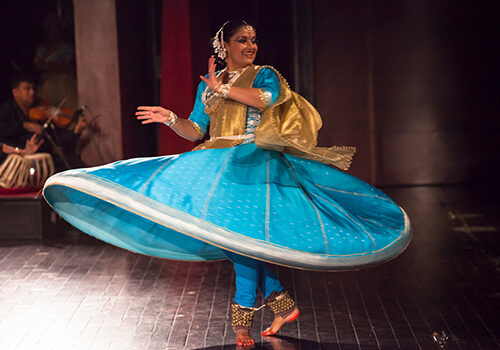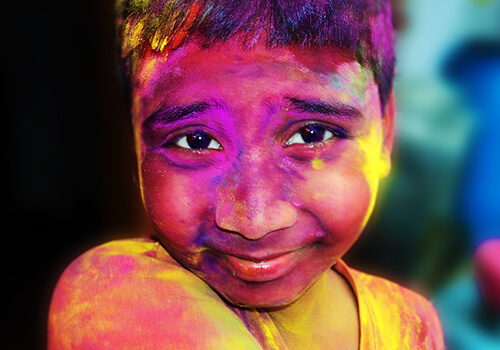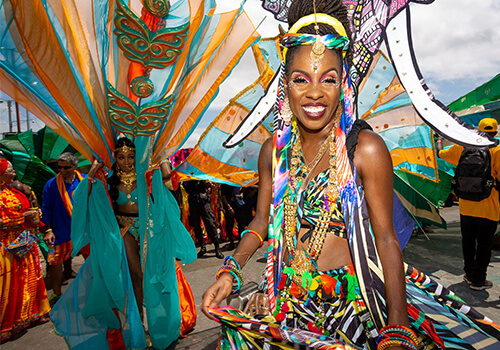The diversity and inclusiveness that has become synonymous with T&T has shaped the way we observe all our festivals and holidays. By our intrinsic nature, we are a social society. We socialize around food, sharing of ‘fun’ events, dressing up even ’out-dressing’ each other. We also socialize around the ‘rituals’ (the puja, going to mosque, prayer group or temple). Putting socialization around cultural/religious events together highlights how complex it all is, yet at the core is the simple truth that humans are social beings and Trinidadians are excessively so.
Celebrating the essence of our identity has been met with a halt, Covid-19 swiftly deleting all pre-existing social norms, ushering in what will be a new, post-pandemic way of life. The question to ask ourselves moving forward is “how can a socially active society protect our physical health and well-being while staying true to our social, spiritual and cultural identities?” Will we stop celebrating? No. Will we change how we celebrate these? Yes. We will learn to evolve and adapt. We will resourcefully create a new socially safer ‘middle ground’ that meets our needs. It has become too much of our DNA not to do so.
What type of impact would the Covid-19 pandemic have on the celebrations of festivals in Trinidad and Tobago and regionally?
Covid-19 arrived during the Lenten period 2020, closing all church doors between The Vatican and T&T, making Easter the first stay-at-home religious holiday. Reaching its peak during Ramadan, it entirely upheaved the way Muslims traditionally observed their holy month. A year of tech-supported innovation later, cultural, community and religious celebrations have leaned heavily on digital pillars slowly opening ourselves more to embracing virtual windows that would continue in 2021.
As someone who grew up in a conservative Muslim home with strict Catholic school upbringing, I’m in a position to say that ‘Ramadan is to Eid as Lent is to Easter’. Followers of these faiths and their families look forward to these ‘seasons’ with great anticipation, planning new menus and altering consumption habits. It’s as deeply personal and spiritual as it is social. Breaking fast, sharing meals with loved ones, be it Sunday mass at church, chanting prayers for Hanuman Jayanti, or long, soulful nights of ‘Tarawih’ prayer at every mosque in every community, these are the ‘little BIG things’ that re-establish and renew bonds, nurturing parts of our society.
A huge bite has also been taken from the cultural slice of our pie. Carnival, Divali Nagar, Mother’s Day, the upcoming Indian Arrival Day and long weekends bring with them a buzz of manic social activity. East Indian concerts, curry duck cookoffs, local theatrical performances and festivals like ‘New Fire’ are just a taste of the many anticipated ritual calendar events which have been postponed or cancelled. Without them, it leaves us with a void, one that CAN be filled with alternative ways of reverence, celebration, heralding an opportunity for out-of-the-box thinking into new, unexplored avenues. As uncharted and intriguing as this is, it can’t be ignored that partial loss of ‘community identity’ and a cavity of nostalgia still lingers.

Susan Mohip performing at Pan on a Higher Note

The colourful Hindu celebration known as Phagwa

The Greatest Show on Earth, Trinidad and Tobago Carnival
How do you think that religious leaders and followers have adapted religious observances and practices considering the social distancing protocols implemented due to the threat of Covid-19? What has been their advice to followers?
To understand the advice and lifestyle approach from leaders in the Muslim community is to understand a little more behind the religion itself. For Muslims, like most religions, life is sacred and its preservation supercedes what might otherwise formally be required. Islam came as a way of life and guide for reaching one’s optimum potential as a human being. This in mind, it makes allowances for the temporary ‘stopping’ of what’s usually required in an effort to preserve and protect all life. To safeguard congregations against the very real threat of Covid-19, Imams similarly to Priests, Pundits, Ministers and other religious group leaders have advised their congregations to stay at home and not come out to the places of worship.
The pandemic has ignited a spark of creativity into the world of worship. Religious leaders have been forced to step up and become even more innovative seeking new avenues to connect with their followers at home and maintain a sense of community. There is a local tailoring to how we have now come to observe and practice religion but a great part of that is influenced by how the global religious communities are positioning themselves.
From church Youtube channels to livestreaming mass and prayers from Mecca, online call/ advice segments, daily, online prayer sessions allowing members to see and interact with one another ‘face to face’, virtual ‘iftars’ breaking fast together, even creating religious social media accounts. The new channels being applied are endless however there’s still room for more local religious leaders to continue pushing boundaries on how they can get their congregations to be even more creative while still being mindful of Public Health and being their brother or sister’s keeper.
Followers, on the other end, have tried to maintain a line of contact and community by organizing charities and collections to help feed families suffering financially from a loss of jobs. With less time being spent engaged in errands, shopping, socializing or at the mosque, the social-distancing side of Ramadan finds worshippers getting the opportunity to focus more on the introspective component and more quality time with their families at home.
Do you think that social distancing in any way dilutes the meaning of these festivals to the persons who observe and celebrate them? How?
Social distancing will not dilute the core meaning and lessons to be extracted from our religious observances nor the cultural events we follow religiously. Eid will still be the celebration after a month of fasting and so will Divali, followed by Advent for Christmas and Carnival that precedes Lent.
The value of religion and festivity does not change however some of the bells and whistles that traditionally have come to make celebrations attractive and popular will be significantly altered by it. The same intricate balance and social complexity around cultural/religious events mentioned earlier. What will be diluted is the outward expression of physical love and the outpouring of it. The bonds of a people strengthened by physical embrace and affection will have to be restrained for our own sakes, hopefully temporarily but perhaps longer. However, as a widely creative society with a clear sense of humour, there is an opportunity to re-create and reinvent the way we display affection. After all, there’s no one who can take a batch of sour lemons and turn it into some extra sweet parlour juice the way we can in T&T.
Written by:
Asma Ali
Creative Director, Ogilvy Caribbean
(Supporting research from Dr Vishwanath Partapsingh and Amir Mohammed)

